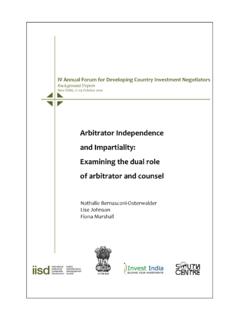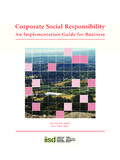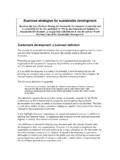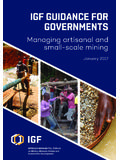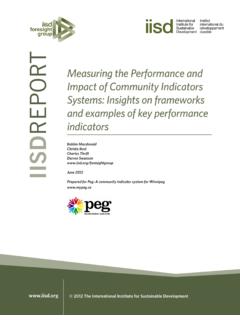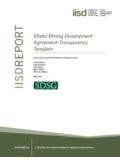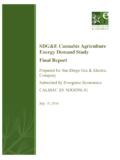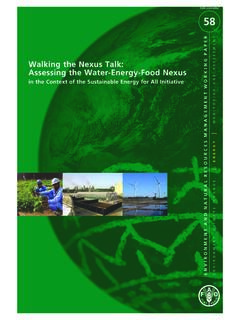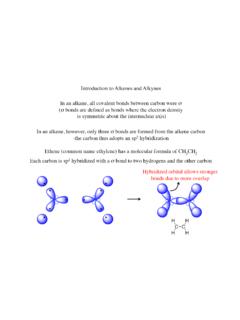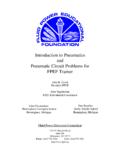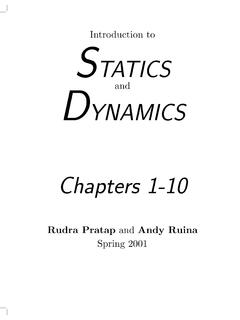Transcription of Locating the Energy for Change: An Introduction to ...
1 Locating the Energy for Change: An Introduction to Appreciative InquiryCharles ElliottDean of Trinity HallUniversity of CambridgeIISDINTERNATIONALINSTITUTE FORSUSTAINABLEDEVELOPMENTINSTITUTINTERNA TIONAL DUD VELOPPEMENTDURABLEIISD-Apprec Inq 4/12/99 6:35 PM Page iThe International Institute for Sustainable Development(IISD) is an independent, not-for-profit corporation head-quartered in Winnipeg, Canada, established and supportedby the governments of Canada and Manitoba. Its mandate isto promote sustainable development in decision-making inCanada and around the Charles Elliott 1999 Published by the International Institute for SustainableDevelopmentAll rights reservedPrinted in CanadaCopies are available for purchase from IISD. Copies may also be ordered through IISD s online order format Cataloguing in Publication DataElliott, Charles, 1939- Locating the Energy for change: an Introduction to appreciative inquiryIncludes bibliographical 1-895536-15-41.
2 Organizational change. I. International Institute forSustainable Development. II. '06C99-920073-9 This publication is printed on recycled Institute for Sustainable Development161 Portage Avenue East, 6th FloorWinnipeg, ManitobaCanadaR3B 0Y4 Tel: (204) 958-7700 Fax: (204) 958-7710E-mail: the Energy for Change: An Introduction to Appreciative InquiryiiIISD-Apprec Inq 4/12/99 6:35 PM Page iiAcknowledgementsAs will quickly become apparent, this book depends on the cooperation of many,many people. At the risk of failing to acknowledge some, I would like to say abig thank you to the following: to Neil Ford at the IISD for making this volume available to a widerpublic to David Cooperrider and his colleagues at Case Western University forpioneering appreciative inquiry and sharing their findings so generously to my colleagues in the Cambridge Partnership for OrganisationalTransformation who have taught me so much, and especially to MetteJacobsgaard with whom I shared much of the fieldwork reported in thisvolume to my colleagues in Trinity Hall, Cambridge for granting me leave ofabsence to do much of the fieldwork to Virginia Greany who helped read proofs against a tight deadline atconsiderable personal inconvenience to all those people and organizations that have undertaken an apprecia-tive inquiry and shared the process and outcomes with me.
3 Withoutthem, this book could never have been Petrik edited the original manuscript and coordinated the layout and printproduction. Shannon Brown, Lael Dyck, Virginia Gonzales and Alison Patmoreentered the edits to the manuscript. Don Berg designed the volume s cover andtypeset the Elliott,Trinity Hall, March, Inq 4/12/99 6:35 PM Page iiiAbout the authorCharles Elliott, Dean of Trinity Hall, teaches economics at the University ofCambridge in the UK. He founded the Cambridge Partnership forOrganisational Transformation to promote the practice of appreciative inquiryand has used it on three continents with groups as diverse as churches and pris-ons; African villages and multinational corporations; clinics and law is married with three grown sons and a the Energy for Change: An Introduction to Appreciative InquiryivIISD-Apprec Inq 4/12/99 6:35 PM Page ivForewordThe International Institute for Sustainable Development (IISD) is publishingthis book to introduce development practitioners to appreciative inquiry.
4 Thismethodology can help them turn sustainable livelihoods from a theoretical con-cept into a practical approach. What s more important, it can help local peoplebuild improved, sustainable futures for themselves and their children, based ontheir strengths and achievements. To date most applications of appreciative inquiry have taken place in the corpo-rate world. Indeed, many of Elliott s examples come from executives who arepositioning their businesses for the 21st century. But what works for companiescan also prove valuable for communities, especially those that are struggling atthe subsistence level, as Elliott demonstrates so effectively through his case stud-ies from West Africa. Local people can use the appreciative approach to identifytheir current strengths, then plan an improved future, based on their under-standing of the positive present. I believe that appreciative inquiry is an excit-ing tool that local people can use to empower themselves and break free frompoverty through their own vision and has been working in poverty alleviation and empowerment since it wasfounded in 1990.
5 We began by exploring the complex livelihoods of rural peo-ple in drought-prone areas of Africa to help us understand why five decades ofdevelopment assistance had made such a small impact. IISD defines livelihoodsas the activities, assets and entitlements that poor people use to survive. Unlikethose of us who work for wages in developed economies, families struggling tolive in the developing world usually depend on a number of activities. The fathermay herd goats and also pan for gold in a nearby stream. The children may ped-dle crafts in the street. The mother may grow food in a communal garden. Noneof it adds up to much, but by working together, family members can achieve abasic can they ever prosper, and if so, will they prosper without diminishingopportunities for their children and grandchildren? For IISD a family s livelihoodis sustainable when it can cope with stresses and shocks such as floods or lowcommodity prices, when it can maintain and enhance the family s capabilitiesand assets, and when it can preserve the natural resource base of the communityfor future generations.
6 By 1995, through workshops and fieldwork, we haddeveloped a framework that described the elements that produce sustainablelivelihoods. They are: community adaptive strategies and local knowledge; enabling policies; Locating the Energy for Change: An Introduction to Appreciative InquiryvIISD-Apprec Inq 4/12/99 6:35 PM Page v appropriate science and technology; and access to credit and investment us the first element is the most important. A community must understandwhat makes it strong if it is to participate effectively in decisions that affect locallivelihoods. This knowledge can then be used to inform the other three elementsto improve the overall community current challenge is to help communities participate effectively within thissustainable livelihoods framework by developing techniques and methodologiesto help local people understand their strengths, analyze their options, plan effec-tively and participate more equally in decision-making.
7 That s where appreciativeinquiry can make a contribution. The current state of the art in poverty allevia-tion is the use of participatory methodologies to help local people identify prob-lems, resource constraints and unmet basic needs. Development professionalsthen work in partnership with local people, implementing projects to fix theproblems. Although this approach is logical and efficient, it can often disem-power the community it is meant to help, by conditioning local people to viewtheir village as a place full of problems that only outsiders can solve, and needsthat only governments can meet. The problem-oriented approach can establish asense of dependency in the community that seems insurmountable. As a result,community participation often dwindles when a project finishes and develop-ment professionals withdraw. Sustainability is difficult to inquiry starts from a fundamentally different and more positive point.
8 It is designed to help local people identify their achievements. This processcan be very empowering for people who have always considered themselves poorand disadvantaged. When they look for their strengths, they are often amazed todiscover how resilient, adaptive and innovative they are. They have to be poverty is a cruel and unforgiving circumstance. By focusing on their strengthsthey can use the positive present to build a shared vision of a better future, onethat is grounded in reality. Appreciative inquiry creates a development pathwaybased on what is right rather than what is can appreciative inquiry help poor people protect and preserve their naturalresource base, ensuring opportunities for future generations? Can it open up newincome-generating opportunities? Can it enhance social conditions? Quite sim-ply, we don t know, and we won t until we have more experience helping localpeople use appreciative inquiry and have evaluated its results more rigorously.
9 Initial indications, however, are positive. The appreciative approach encouragespeople to think deeply about the ways they would like to develop. What con-tributes to the well-being of their community? Material success? Culturalidentity? A clean environment? Can they choose a development pathway thatLocating the Energy for Change: An Introduction to Appreciative InquiryviIISD-Apprec Inq 4/12/99 6:35 PM Page vidoes not sacrifice some of these goals to achieve others? This holistic emphasis,this focus on gross national happiness rather than gross national product, fits wellwith a concept of sustainable development that integrates economic growth,environmental integrity and human Elliott is a pathfinder. He has used appreciative inquiry in corporate andinstitutional settings, then applied the lessons he has learned to communitydevelopment in poor and remote regions of the world.
10 It s up to us communitymembers, development professionals, corporate citizens and public servants towiden that path into a well-travelled road to sustainable FordProgram Director, Community Adaptation and Sustainable LivelihoodsInternational Institute for Sustainable DevelopmentJanuary, 1999 Locating the Energy for Change: An Introduction to Appreciative InquiryviiIISD-Apprec Inq 4/12/99 6:35 PM Page viiLocating the Energy for Change: An Introduction to Appreciative InquiryviiiIISD-Apprec Inq 4/12/99 6:35 PM Page viiiTable of ContentsAcknowledgementsiiiForewordvIntr oduction: A first glimpse of the appreciative mode1 Part 1. Some theoretical soundings7 Chapter 1. The appreciative approach91 Learning and looking92 Reading the text143 The organization as text174 Writing the text195 The appreciative approach and ideal speech22iPower asymmetries22iiThe intrusiveness of ideology24iii Commitment to the process25iv Critical self-reflection27 Chapter 2.

